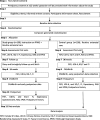Evaluation of the effect of an antenatal pelvic floor muscle exercise programme on female sexual function during pregnancy and the first 3 months following birth: study protocol for a pragmatic randomised controlled trial
- PMID: 30786930
- PMCID: PMC6383244
- DOI: 10.1186/s13063-019-3226-6
Evaluation of the effect of an antenatal pelvic floor muscle exercise programme on female sexual function during pregnancy and the first 3 months following birth: study protocol for a pragmatic randomised controlled trial
Abstract
Background: Sexual dysfunction can have a negative impact on women's quality of life and relationships. There is limited information about female sexual function and treatment, particularly during pregnancy and the postpartum period. The effect of pelvic floor muscle exercise (PFME) on sexual function (SF) has not been studied adequately. The purpose of this study is to investigate the effect of antenatal PFME on female SF during pregnancy and the first 3 months following birth.
Methods/design: This is a pragmatic, randomised controlled trial which will compare a structured antenatal PFME programme combined with standard antenatal care to standard antenatal care alone. Eligible women who are less than 22 weeks' gestation will be recruited from the antenatal clinics of one hospital located in Western Sydney, Australia. A sample of 200 primiparous pregnant women who meet the inclusion criteria will be randomised to either control or intervention groups. This sample size will allow for detecting a minimum difference of 9% in the female SF score between the two groups. The duration of the PFME programme is from approximately 20 weeks' gestation until birth. Female SF will be measured via questionnaires at < 22 weeks' gestation, at 36 weeks' gestation and at 3 months following birth. Baseline characteristics, such as partner relationship and mental health, will be collected using surveys and questionnaires. Data collected for secondary outcomes include the effect of PFME on childbirth outcomes, urinary and faecal incontinence symptoms and quality of life.
Discussion: The findings of this study will provide more information on whether a hospital-based antenatal PFME has any effect on female SF, urinary and faecal incontinence during pregnancy and the first 3 months following birth. The study will also provide information on the effectiveness of antenatal PFME on childbirth outcomes.
Trial registration: Australian New Zealand Clinical Trials registry, ACTRN12617001030369 . Registered on 17 July 2017.
Keywords: Childbirth; Faecal incontinence; Female sexual function; Pelvic floor muscle exercise; Pragmatic; Protocol; Randomised controlled trial; Urinary incontinence.
Conflict of interest statement
Ethics approval and consent to participate
Ethical approval was obtained from Western Sydney Local Health district, Westmead Hospital and Western Sydney University on 05th December 2017, 19th Jan 2018 and 25th Jan 2018, respectively. The recruitment started on 11/02/18.
Consent for publication
Consent will be taken from all the authors before submission of paper.
Competing interests
CAS declares that the National Institute of Complementary Medicine receives research grants and donations from foundations, universities, government agencies and industry. Sponsors and donors provide untied and tied funding for work to advance the vision and mission of the Institute.
Funding for this research has been received in the format of an Australian postgraduate award scholarship, of which SSS is a recipient, and “research training funds” provided by Western Sydney University as a standard resource to all higher degree by research candidates.
HP and HGD also declare that they receive government and university research grants.
Publisher’s Note
Springer Nature remains neutral with regard to jurisdictional claims in published maps and institutional affiliations.
Figures
References
-
- Weig W. Sexual dysfunctions from a neuropsychiatric perspective. Organ der Deutschen Gesellschaft für Psychiatrie, Psychotherapie und Nervenheilkunde Organ der Deutschen Gesellschaft für Neurologie. 2006;77(1):101–109.
-
- Zahra Z, Golmakani N, Nayare K, Shareh H, Shareh H, Shakeri M-T. The effct of pelvic floor muscle training on quality of sex life and marital satisfaction in primiparous women after birth. JOCI. 2014;17(103):21–32.
-
- Ferreira C, Dwyer P, Davidson M, Souza A, Ugarte J, Frawley H. Does pelvic floor muscle training improve female sexual function? A systematic review. Incl Pelvic Floor Dysfunct. 2015;26(12):1735–1750. - PubMed
-
- Running A, Smith-Gagen J, Wellhoner M, Mars G. Acupuncture and female sexual dysfunction: a time-series study of symptom relief. Med Acupunct. 2012;24(4):249–255.
-
- Frank JE, Mistretta P, Will J. Diagnosis and treatment of female sexual dysfunction. Am Fam Physician. 2008;77(5):635–642. - PubMed
Publication types
MeSH terms
Grants and funding
LinkOut - more resources
Full Text Sources
Medical




